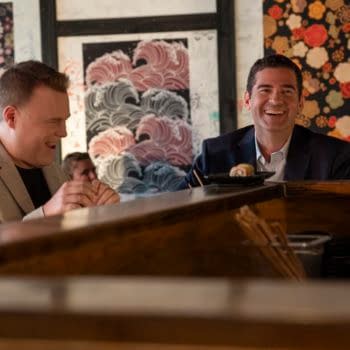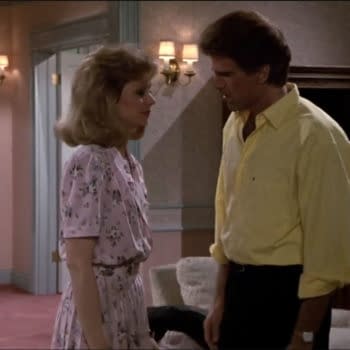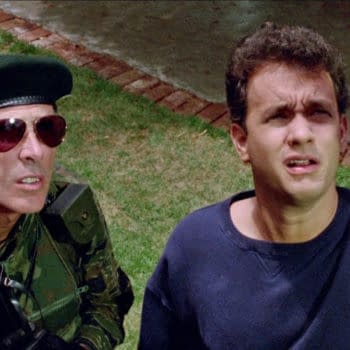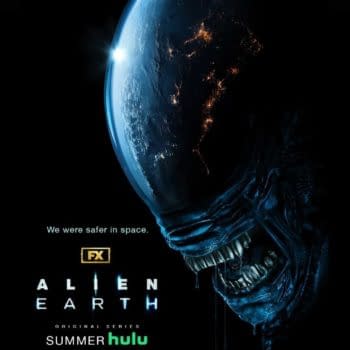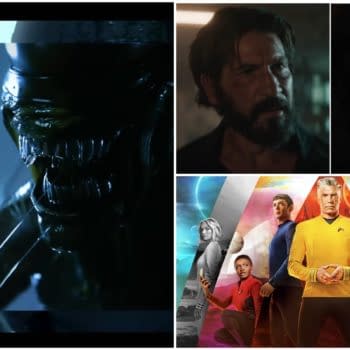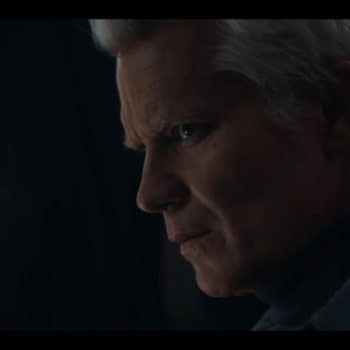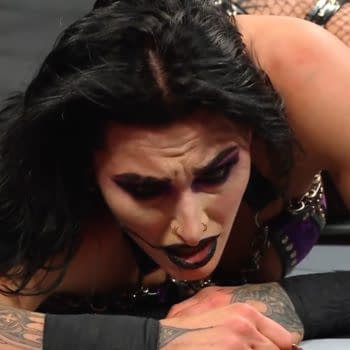Posted in: CBS, Star Trek, TV | Tagged: bleeding cool, cable, cbs all access, gene roddenberry, jean-luc picard, jeri ryan, Jonathan Frakes, Picard, seven of nine, star trek, Star Trek Picard, streaming, television, The Hollywood Reporter, tv
"Star Trek: Picard" – Jonathan Frakes Talks Jean-Luc/Seven Borg Bond, Embracing Gene Roddenberry's Legacy & Evolving Beyond
One of the most definitive moments of Star Trek: The Next Generation and Jean-Luc Picard (Patrick Stewart) is his assimilation by the Borg in the two-parter "The Best of Both Worlds." Since then, the Trek franchise revisited his trauma multiple points during the remainder of the series' run. The most notable instances were during First Contact (1996) and Picard.
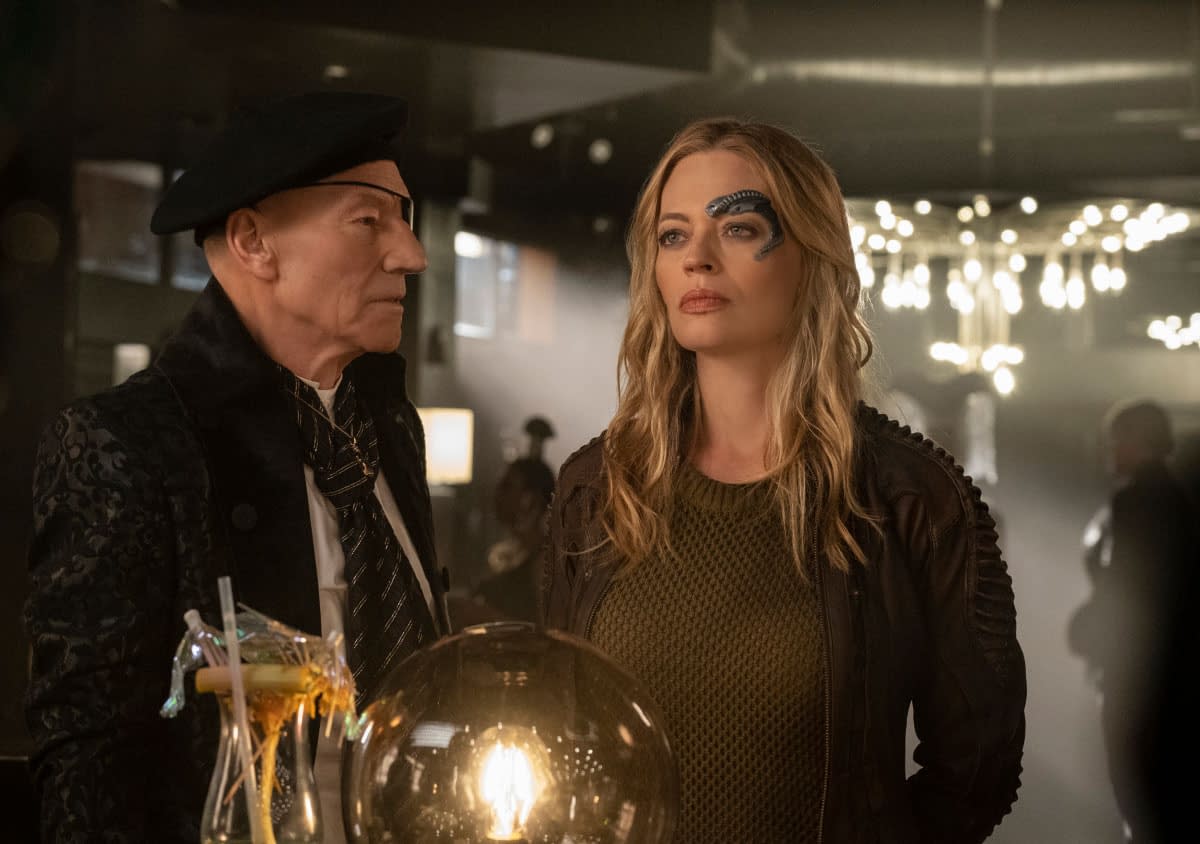
Bringing Two "Star Trek" Icons Together
Jonathan Frakes, who played Cmdr. William Riker in TNG revisited the former Starfleet admiral's link to the collective in the Picard episode "Stardust City Rag" on CBS All Access. It pitted meeting the former captain of the U.S.S. Enterprise with a life-long Borg drone who served onboard the U.S.S. Voyager, Seven of Nine (Jeri Ryan). The director spoke to The Hollywood Reporter about what it meant to bring the two together.
"It was completely the luck of the draw, but I was grateful to be apart of reintroducing fans to Seven, particularly their mini-scene — where these two former Borgs — they exchange their baggage and their feelings about having been 'Borg-ified.' It's one of my favorite scenes I've ever done."
Their Too Brief Meeting
Sure, Picard and Seven weren't the first assimilated nor the last, but they're the two most prominent. The Borg assimilated her as a child named Annika Hanson. She lived most of her life as a drone before Janeway (Kate Mulgrew) and Voyager freed her. The two had only, but a brief time to empathize with one another about their enslavement. Unfortunately, Starfleet's inactions for the Romulans had a far greater ripple effect. Seven found herself aligned with the Fenris Rangers as a vigilante.
Both Jean-Luc and Seven contrast in their paths. Jean-Luc struggles to make peace with his humanity after what he did as Locutus. Seven gives up on hers after humanity erased any peace she had left. Since contemporary Star Trek predicates more on internal conflicts, Frakes said it conflicts with Gene Roddenberry's original vision.
"We never could have done [a scene like] this on [TNG]. Why? Gene Roddenberry. The creator of Star Trek believed that, in TNG's 24th Century, there would be no conflict amongst "the family, the crew of the Enterprise,"
Frakes credits the current creators and writers for Stewart and Ryan's chemistry and powerful storytelling.
"The scene was mostly worked out with the help of Michael Chabon and our wonderful writers and new additions to the Star Trek family: Akiva Goldsman, Alex Kurtzman, Kirsten Beyers. It's such a simple and beautifully-performed scene between the two actors. Jeri was struggling with finding the quote-unquote voice of Seven. In that she felt that the current version of her character, almost 20 years later, it was challenging to get a bead on what has happened to [Seven] in the passage of time? Is there a world in which Seven could or could not find who she was?
And Chabon explained what he felt was going on, and Jeri explained what she felt might be missing and might have resonated through these last 20 years, and they came to this [middle ground] on where Seven is. Who, on the Picard show, is a character that — you got to give credit to Jeri, playing her older and wiser. She is definitely better than she was on Voyager. It's great to have her back."
Gene Roddenberry's "Star Trek" vs. "Star Trek" of Today
Frakes said allowing the writers to internalize the characters' struggles and building upon the foundation of Roddenberry's original vision creates more compelling TV.
"As we know, conflict is what creates drama. So, on Next Gen, it was a very challenging set of rules — primarily for the writers — to find ways to create drama. In this new version of Star Trek, which honors what Roddenberry laid out — in terms of the optimism and respect toward themes like racism — all of those elements are sort of strongly rooted in this show, but the notion of self-doubt, the vulnerability — especially for a [character] like Picard — the damage of past experiences, are so much more compelling to watch … It's a denser show than Next Gen, I think that's fair to say. Pushing Picard to these places, watching Patrick act that out — and he was in the writer's room as they developed this story — it's all so rewarding to see."
Star Trek: Picard airs Wednesdays on CBS All Access.






